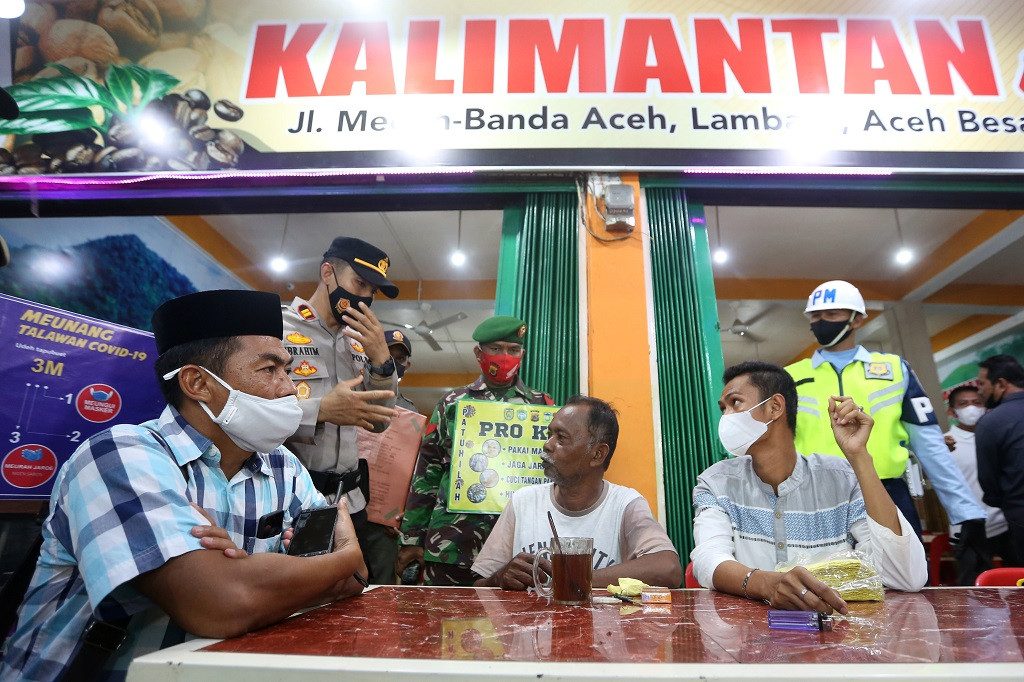Popular Reads
Top Results
Can't find what you're looking for?
View all search resultsPopular Reads
Top Results
Can't find what you're looking for?
View all search resultsFew concessions to business as mobility curbs extended
The government has relaxed some COVID-19 curbs for small businesses but has largely stayed the course as it extends multi-tiered public activity restrictions (PPKM) despite pressure from business groups.
Change text size
Gift Premium Articles
to Anyone
T
he government has extended multi-tiered public activity restrictions (PPKM) once again, while loosening certain provisions to allow for more economic activity, but business players had expected more.
Coordinating Maritime Affairs and Investment Minister Luhut Pandjaitan told reporters on Sunday that the government had softened certain restrictions, especially for micro, small and medium enterprises (MSMEs) and tenants in shopping malls.
He said the decision was based on three main factors: COVID-19 case numbers, the pressure on healthcare services and socioeconomic conditions.
“[President Joko ‘Jokowi’ Widodo] really emphasized the last one, namely the socioeconomic conditions of the community,” Luhut said during an online press conference where he also pledged to enforce health protocols to prevent a surge in cases as a result of the relaxation.
The policy change loosens restrictions in areas categorized as level 4, the highest of the four-tiered PPKM system. Traditional markets selling staple foods in these areas are no longer obliged to close at 8 p.m. or serve only half the number of visitors they normally would, and markets selling non-staple foods or other goods may now remain open until 3 p.m. with reduced occupancy, after previously being closed completely.
Food vendors in open spaces in level 4 areas may now offer dine-in services again until 8 p.m., while in level 3 areas, all stalls may offer dine-in services at a quarter of the usual occupancy.
Some MSMEs, including laundromats, grocery stores and barbershops, will be allowed to operate until 9 p.m. in areas under level 3 and level 4 restrictions.
Malls in level 3 areas may now open again, although at only 25 percent of capacity and until 5 p.m. Export-oriented industries in level 3 areas may now operate at full staffing, rather than the previously mandated 50 percent, but the workforce must be divided into two shifts of 50 percent each.
Coordinating Economic Affairs Minister Airlangga Hartarto added that the government promised to exempt shops in malls from value-added tax (VAT) on their rent from June to August. He did not offer further details of the plan.
“A ministerial regulation [on malls] is in progress. [New rules will also apply to] other sectors impacted by COVID-19, namely transportation, hotels, restaurants, cafés and tourism,” Airlangga said, speaking at the same press conference as Luhut.
Presentation material from the National Economic and COVID-19 Recovery Committee obtained by The Jakarta Post suggested that the government planned to keep the restrictions in place until at least Aug. 8.
Susiwijono Moegiarso, secretary of the Office of the Coordinating Economic Minister, said on Sunday that the document was “from two days ago” and showed revised material, according to which the restrictions would last until Aug. 2.
Indonesian Employers Association (Apindo) deputy chairwoman Shinta Kamdani said businesses had maintained their position on the restrictions, namely that the government should allow sectors categorized as essential to operate at full capacity and non-essential sectors to operate at half capacity.
She said the pandemic response in the industrial sector could instead rely on vaccinations and on reviewing and enforcing health protocols, rather than on comprehensive activity restrictions.
“Negative consequences for the economic recovery could be averted,” Shinta told The Jakarta Post on Monday.
Aside from easing restrictions, Shinta urged the government to provide loans to businesses impacted by COVID-19 to help with their capital needs, as well as to restructure existing loans and defer repayments. She also urged the government to retain other stimulus measures for businesses concerning income tax, electricity bills and wage payment, as well as VAT and luxury goods taxes to support consumer spending.
Indonesia Traditional Market Vendors Association (Ikappi) spokesperson Muhammad Ainun Najib welcomed the looser restrictions in a statement released on Sunday but urged the government to be consistent with the implementation on the ground.
The association also asked the government to provide stimulus funds for vendors, as many had reported worsening business conditions over the past few weeks because of the restrictions.
MSME Association (Akumindo) chairman Ikhsan Ingratubun remained skeptical of the policy shift. He said there was almost no difference between the preceding PPKM policy and the current one, as MSMEs were able to operate even under the previous set of rules.
“Loosening the prolonged PPKM is just a symbolic move,” Ikhsan told the Post on Monday, adding that MSMEs expected the government provide them with cash or capital aid as compensation for the loss of business.










